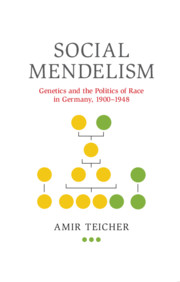Book contents
- Social Mendelism
- Social Mendelism
- Copyright page
- Dedication
- Epigraph
- Contents
- Figures
- Acknowledgments
- Abbreviations
- Introduction
- 1 Mendel’s Laws and Their Application to Humans, 1865–1913
- 2 Mendelism Maturing: From Experimental to Interpretative Framework, 1913–1933
- 3 Mendelism, Purity and National Renewal
- 4 Annihilating Defective Genes: Mendelian Consciousness and the Sterilization Campaign
- 5 Mendelizing Racial Antisemitism
- Epilogue: Social Mendelism beyond the Nazis
- Bibliography
- Index
3 - Mendelism, Purity and National Renewal
Published online by Cambridge University Press: 03 February 2020
- Social Mendelism
- Social Mendelism
- Copyright page
- Dedication
- Epigraph
- Contents
- Figures
- Acknowledgments
- Abbreviations
- Introduction
- 1 Mendel’s Laws and Their Application to Humans, 1865–1913
- 2 Mendelism Maturing: From Experimental to Interpretative Framework, 1913–1933
- 3 Mendelism, Purity and National Renewal
- 4 Annihilating Defective Genes: Mendelian Consciousness and the Sterilization Campaign
- 5 Mendelizing Racial Antisemitism
- Epilogue: Social Mendelism beyond the Nazis
- Bibliography
- Index
Summary
Mendelian thinking led to the refashioning of concepts with larger social, political and cultural implications. Mendelian theory offered a new way for thinking about the meaning of national purity and (racial) hybridity – or, as the Germans preferred to call it, “bastardization.” It also suggested a new concept that quickly became a focal point for scientific, medical and social anxieties: recessive traits. The new toolbox which Mendelism offered impinged directly on the emerging visions for racial regeneration, which became attractive for fascist thinkers propagating the rebirth of the nation. Furthermore, Mendelian teaching became part of the discussions on the pathological nature of Jews, on the one hand, and of the cultural exaltation of the peasanthood as the fountain of racial renewal, on the other hand. Whereas the recessive nature of Jewish traits could account for the negative evaluation of the Jews, the recessive nature of blindness aided in boosting up the amount of Nordic blood among peasants. Thus, national ideology became saturated with Mendelian terms and concepts.
- Type
- Chapter
- Information
- Social MendelismGenetics and the Politics of Race in Germany, 1900–1948, pp. 89 - 124Publisher: Cambridge University PressPrint publication year: 2020

